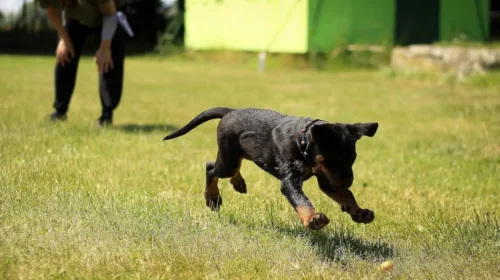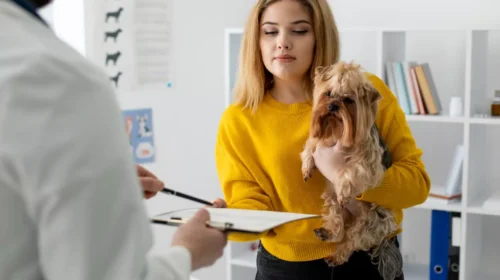Top Tips for Keeping Your Dog Safe and Healthy
Your dog brings joy and love to your life. But they need you to keep them healthy. Start with the basics to keep your pet healthy and happy for many years.
Dogproof Your Home
Make sure your home is safe for your pet. You should secure any electric cords that they may chew, close the toilet lids, and ensure they are not allowed to get into medication or household cleaners. Have a swimming pool in your backyard? You might consider a pool fence for your dog or a motion detector system to alert you if they slip into the water. Double-check that your dog is not allowed to eat human food. You might consider using child-proof latches for cabinets and trash cans if your pet is particularly curious.
Register for a Vaccination Schedule
Vaccines, just like people, are the best way to protect your dog’s health. They protect your pup from potentially fatal, contagious diseases such as parvo, distemper, and rabies. You can discuss with your vet the schedule and shots that they will need, depending on how healthy they are and where you live. Most puppies will need their first shot at 6 weeks. Then, they should be vaccinated every 3 weeks until they reach 16 weeks. Adult dogs should be revaccinated approximately every 1 to 3 years.
Select the right food
When it comes to food, your dog’s weight, age, and activity level all matter. The Association of American Feed Control Officials will usually put a statement on your food. This means that the food is nutritionally complete and balanced. Raw foods can cause serious health problems in animals like E. coli infection, according to the American Veterinary Medical Association and other organizations. E. coli and other dangerous bacteria. Dogs’ stomachs and intestines can be torn by bones.
Spay or neuter your pet
Every year, millions of homeless dogs are admitted to shelters and many of them end up being killed. Spaying or neutering your dog can prevent them from becoming pregnant. These procedures can also be beneficial for your pet. Spayed females are less likely to develop breast cancer or uterine infections later on in their lives, while neutered males are more likely to get the prostate disease and testicular carcinoma. Although the procedures are generally safe for pets, you should consult your vet to discuss any potential risks.
Get Moving
Dogs require exercise just like humans. Exercise keeps dogs healthy and gives them a chance to release their mental and physical energy. This can help to curb bad behaviors like barking and digging (which dogs do when they are bored), as well as other undesirable ones such as chewing, barking, or barking. You can get the best exercise by doing it together. Dogs love to interact with humans so find activities that you can all do together. Bonus: It keeps you moving.
Brush your dog’s teeth
It is important to brush their teeth at least once a day. This keeps their breath fresh and prevents gum disease. Ask your vet for recommendations on the best kinds of toothpaste and toothbrushes for dogs. Watch out for signs of dental disease such as bleeding, discoloration, or bad breath. Your vet should check the mouth of your dog every year.
Keep your pet cool and warm
Your dog will need extra support when it gets hot or cold. To keep your dog’s paws from being burned by the hot asphalt, you can take them to the shade or grass during the summer heat. Make sure your dog has plenty of water and shade. Ask your vet if you can use sunscreen on dogs with a thin coat of fur. You should never leave your dog alone in a car in the summer months. The temperature inside a car can reach 20 degrees in 10 minutes. It gets hotter the longer they stay in there. Even though it may only be 80 degrees outside, the temperature inside can rise to 114 degrees within 30 minutes.
Your best option to protect your dog against low winter temperatures is to keep them inside as much as you can. Consider getting your dog a sweater or booties for walks. This is especially important if they are wearing a short coat. Antifreeze can cause serious illness in dogs if it is too small. Make sure they clean up any spills and don’t allow them to eat snow.
Prevent Parasites
Talk to your veterinarian about the best flea and tick prevention medication. These parasites can cause severe health problems and irritation in dogs. Heartworms can cause heart disease and lung disease. Fleas can also lead to anemia and ticks can spread Lyme disease.
Be prepared for poisoning
Call the nearest poison control center (888-426-4435) if your dog has swallowed something that could cause harm. You can also call the ASPCA Animal Poison Control Center (888-426 4335) and have your dog taken to an emergency vet. Do not take chances — even small amounts of chocolate can cause poisoning in dogs, and one dose of ibuprofen could lead to kidney failure.
Be on the lookout for warning signs
Dogs won’t let you know if they are feeling sick so be aware of signs. If you see any warning signs that your dog is suffering from a health problem such as:
Do not touch the nose, eyes, or any other parts of the body.
Bad odors emanate from any part of the body.
They lick or bite a lot on their bodies.




